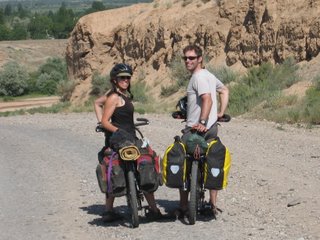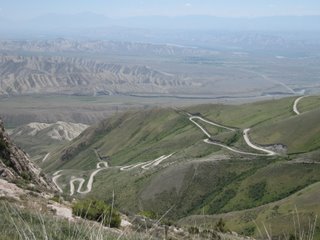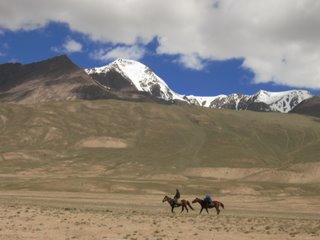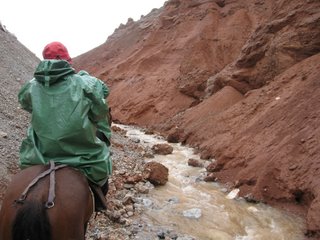Cycling adventures built for two begin in Kyrgyzstan
Chris Writes:Half way across the globe and a world away, we continue to bike and make slow progress.
After a late start from Naryn, Kyrgyzstan, heading south we found what Kyrgyzstan has plenty of, WIND. Making slow progress we inched our way closer to the mountains and our first pass. At the pass, a mere 2800m we wondered how on earth we would find ourselves riding over 4000m through Tajikistan and Tibet, all the while staying alive and enjoying ourselves.
For the past two weeks our spinning wheels took us through desert scrub, high plains and ragged mountains. The towns we pass and the people we meet are all outgoing, offering us tea, home-made sour cheese balls and ample amounts of bread.
Climbing into the mountains, we start our training for Tajikistan, cursing the wind for our slow progress but loving it for the cooling breeze it provides under the hot and unending sun. Slowly our lungs adjust and our legs strengthen with the steep climbs.
Hospitality is a true speciality here in Kyrgyzstan and the people here know how to provide for beautiful memories. While slowly spinning over one of the smaller passes in order to get to the larger ones and dreaming of cold beverages we find a wonderful waterfall, just feet from the edge of the road. Minutes after we begin enjoying the crystal clear water an overly crammed car appears, the type found on many college campuses. A family spanning three generations pours out. Within seconds the usual questions of "Where are you from? What are you doing this for? Who is paying you?" starts. Once the women are satisfied with our answers they instruct their grandchildren to stop playing in the water and fetch us the partially eaten lamb ribs that have been riding in the trunk of their hot car. With a flowing movement of the hand one of the grandmothers removes a piece of fat, the size of a large mans thumb, opens my mouth, inserts the fat and clamps my jaws shut, all the while scolding me for being so skinny. We are so glad to receive ANY food as our supplies have been dwindling from the ravenous appetites we now harboring. Sage, my riding partner is hardly spared as the second car pulls up and the fathers and sons pour out, obviously still enjoying the vodka they had consumed several hours ago. The questions start again and then the bottle of vodka is called for. Being the only foreign male, I am offered the first drink, making it a hard drink to turn down. Oblivious to the remainder of the climb we have to undertake, our new friends insist we drink and enjoy our good fortune. One of the mothers tells Sage in broken English that today was a family member's wedding, the reason everyone is so merry.
While cycling the first real pass and cranking the pedals for over 20km and 5 hours we finally near the top. As the distance to the top of the pass shrinks, we watch as children and grown ups from alike run from their two yurts, up to the roadside, to greet us. The are enthusiastically patting us on the back, raising their hands in cheering fashion and offering us a big glass of kumuiz, better known as fermented mares' milk (the milk from birthing horses, believed to cure whatever ails you and slightly alcoholic in nature). After we make introductions and pass out the remaining toys to the children, one of the women invites us in for chai. The word chai is used as a general term for tea and bread here. As we turn and head toward the yurts, the younger boys eagerly push our overloaded bikes down the grassy slope, other children dance, laugh and play with the new toys all the way to the two structures sitting on the only flat ground found while we hurriedly change into warmer clothes. Once inside we are greeted by a warm stove, fresh, hot bread and a warm smile from the grandmother of the house wrapped in wool blankets. For this particular event the children are not allowed in, only the adults. This does not stop the kids from peeking their curious heads in on occasion or making up silly excuses for entering. The old man to the right of me, now leaning heavily on my leg asks me about the woman next to me, he assumes that she is my wife. After a few minutes he starts giggling like a school girl and in a quiet and shaky voice asks me in slurred Russian how the sex is or something on the subject. Once the man of the home hears the hushed words he immediately and loudly changes subjects, to something more G-rated. The old man now less dependent on my knee, is still laughing quietly, oblivious to his surroundings or the change in conversation.
After only 250km and ten days of riding, pushing and carrying our bikes from Naryn to Kazarman to Jalalabad enjoy two whole days of rest in Osh. The two days are spent cleaning the bikes, doing minor repairs and tightening anything that looks like it could loosen up, then there is shopping and internet to contend with. The hills are steep, full of loose rocks, rutted and shear drop offs. Riding down the other side of the passes, the gravel under our bike tires gives one the feeling of cycling on marbles rolling on clear glass, at times. All the while, being sure to stay clear of the bowling ball sized rocks that appear sporadically in the road. We stop for a rest, and get to watch the only car we have seen in hours hurtle down the mountain slope, oblivious to the dizzying heights, just inches from their car.
Old men stare in disbelief, women stand in awe and kids run next to or behind us, as we pass through the small villages. The people we meet on the roadside always ask us if we are sportsmen (athletes) and who is paying us to do this? We try and explain that we are on this trip to meet people like themselves and to experience foreign cultures and customs. And no, we are certainly not athletes, just two ordinary people who love to eat and cycle. And no unfortunately there is no one to date who has stepped up and offered to pay us for all of this hard work.
As hard as the days are or surely will be, we continue to enjoy cycling the plethora of dirt roads, climbing and descending passes and rolling through little villages not even given a chance on our maps. The food is always fantastic, the watermelons are as ripe and red in the center as strawberries and the meat is incredible fresh despite a clear lack of refrigeration. For two average people who enjoy bicycle travel a little off the map, Kyrgyzstan could not have been better.
We are looking forward to Tajikistan, now just over a week away. We are told Tajikistan is as wild as the American Wild West was during its hay day. The next six weeks will our training ground for Tibet as most of the country is well over 4000m and quite desolate. The roads are reported to be in very poor shape but the people's hospitality is said to be the most generous of any Central Asian country. Cycling through Tajikistan we will be rolling south along the Pamir Highway then turning left and entering the Wakhen Valley, then bicycling along the Afghan/Tajik border until the village of Kharugh.
As for now, we are off to enjoy our last hot shower for several weeks and find enough food to fill our hungry bellies.
Journey On
Chris
After a late start from Naryn, Kyrgyzstan, heading south we found what Kyrgyzstan has plenty of, WIND. Making slow progress we inched our way closer to the mountains and our first pass. At the pass, a mere 2800m we wondered how on earth we would find ourselves riding over 4000m through Tajikistan and Tibet, all the while staying alive and enjoying ourselves.
For the past two weeks our spinning wheels took us through desert scrub, high plains and ragged mountains. The towns we pass and the people we meet are all outgoing, offering us tea, home-made sour cheese balls and ample amounts of bread.
Climbing into the mountains, we start our training for Tajikistan, cursing the wind for our slow progress but loving it for the cooling breeze it provides under the hot and unending sun. Slowly our lungs adjust and our legs strengthen with the steep climbs.
Hospitality is a true speciality here in Kyrgyzstan and the people here know how to provide for beautiful memories. While slowly spinning over one of the smaller passes in order to get to the larger ones and dreaming of cold beverages we find a wonderful waterfall, just feet from the edge of the road. Minutes after we begin enjoying the crystal clear water an overly crammed car appears, the type found on many college campuses. A family spanning three generations pours out. Within seconds the usual questions of "Where are you from? What are you doing this for? Who is paying you?" starts. Once the women are satisfied with our answers they instruct their grandchildren to stop playing in the water and fetch us the partially eaten lamb ribs that have been riding in the trunk of their hot car. With a flowing movement of the hand one of the grandmothers removes a piece of fat, the size of a large mans thumb, opens my mouth, inserts the fat and clamps my jaws shut, all the while scolding me for being so skinny. We are so glad to receive ANY food as our supplies have been dwindling from the ravenous appetites we now harboring. Sage, my riding partner is hardly spared as the second car pulls up and the fathers and sons pour out, obviously still enjoying the vodka they had consumed several hours ago. The questions start again and then the bottle of vodka is called for. Being the only foreign male, I am offered the first drink, making it a hard drink to turn down. Oblivious to the remainder of the climb we have to undertake, our new friends insist we drink and enjoy our good fortune. One of the mothers tells Sage in broken English that today was a family member's wedding, the reason everyone is so merry.
While cycling the first real pass and cranking the pedals for over 20km and 5 hours we finally near the top. As the distance to the top of the pass shrinks, we watch as children and grown ups from alike run from their two yurts, up to the roadside, to greet us. The are enthusiastically patting us on the back, raising their hands in cheering fashion and offering us a big glass of kumuiz, better known as fermented mares' milk (the milk from birthing horses, believed to cure whatever ails you and slightly alcoholic in nature). After we make introductions and pass out the remaining toys to the children, one of the women invites us in for chai. The word chai is used as a general term for tea and bread here. As we turn and head toward the yurts, the younger boys eagerly push our overloaded bikes down the grassy slope, other children dance, laugh and play with the new toys all the way to the two structures sitting on the only flat ground found while we hurriedly change into warmer clothes. Once inside we are greeted by a warm stove, fresh, hot bread and a warm smile from the grandmother of the house wrapped in wool blankets. For this particular event the children are not allowed in, only the adults. This does not stop the kids from peeking their curious heads in on occasion or making up silly excuses for entering. The old man to the right of me, now leaning heavily on my leg asks me about the woman next to me, he assumes that she is my wife. After a few minutes he starts giggling like a school girl and in a quiet and shaky voice asks me in slurred Russian how the sex is or something on the subject. Once the man of the home hears the hushed words he immediately and loudly changes subjects, to something more G-rated. The old man now less dependent on my knee, is still laughing quietly, oblivious to his surroundings or the change in conversation.
After only 250km and ten days of riding, pushing and carrying our bikes from Naryn to Kazarman to Jalalabad enjoy two whole days of rest in Osh. The two days are spent cleaning the bikes, doing minor repairs and tightening anything that looks like it could loosen up, then there is shopping and internet to contend with. The hills are steep, full of loose rocks, rutted and shear drop offs. Riding down the other side of the passes, the gravel under our bike tires gives one the feeling of cycling on marbles rolling on clear glass, at times. All the while, being sure to stay clear of the bowling ball sized rocks that appear sporadically in the road. We stop for a rest, and get to watch the only car we have seen in hours hurtle down the mountain slope, oblivious to the dizzying heights, just inches from their car.
Old men stare in disbelief, women stand in awe and kids run next to or behind us, as we pass through the small villages. The people we meet on the roadside always ask us if we are sportsmen (athletes) and who is paying us to do this? We try and explain that we are on this trip to meet people like themselves and to experience foreign cultures and customs. And no, we are certainly not athletes, just two ordinary people who love to eat and cycle. And no unfortunately there is no one to date who has stepped up and offered to pay us for all of this hard work.
As hard as the days are or surely will be, we continue to enjoy cycling the plethora of dirt roads, climbing and descending passes and rolling through little villages not even given a chance on our maps. The food is always fantastic, the watermelons are as ripe and red in the center as strawberries and the meat is incredible fresh despite a clear lack of refrigeration. For two average people who enjoy bicycle travel a little off the map, Kyrgyzstan could not have been better.
We are looking forward to Tajikistan, now just over a week away. We are told Tajikistan is as wild as the American Wild West was during its hay day. The next six weeks will our training ground for Tibet as most of the country is well over 4000m and quite desolate. The roads are reported to be in very poor shape but the people's hospitality is said to be the most generous of any Central Asian country. Cycling through Tajikistan we will be rolling south along the Pamir Highway then turning left and entering the Wakhen Valley, then bicycling along the Afghan/Tajik border until the village of Kharugh.
As for now, we are off to enjoy our last hot shower for several weeks and find enough food to fill our hungry bellies.
Journey On
Chris





